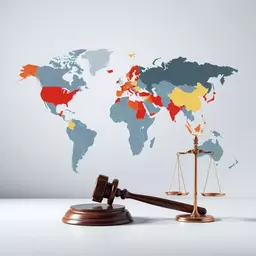Interpol Red Notices and Extradition

Consider this: the implications of a simple alert can steer the course of international law. Understanding Interpol Red Notices is not just for legal professionals; it’s essential for anyone navigating the extradition landscape. These notices, while critical in law enforcement cooperation, come with a complex set of legal, political, and human rights dimensions that can profoundly affect individuals’ lives.
What You Will Learn
- Distinction of Red Notices: Red Notices are not arrest warrants; they are requests for cooperation to locate and detain individuals wanted for prosecution or sentencing.
- Two Types of Requests: Red Notices can be simple or conditional, impacting how each case is handled and individuals’ rights during extradition processes.
- Legal Review Process: The issuance of a Red Notice involves a series of checks, ensuring compliance with international law and protecting individual rights.
- Potential Legal Consequences: Being named in a Red Notice can lead to immediate arrest and legal proceedings, necessitating robust legal representation.
- International Legal Framework: Red Notices must respect human rights laws, and individuals have the right to appeal against them, emphasizing the need for due process.
- Impact on Stakeholders: Legal practitioners, policymakers, and human rights advocates all play crucial roles in the discussions surrounding the ethical implications of Red Notices.
- Future Considerations: Advocating for enhanced legal protections and international cooperation is critical to mitigate the risk of wrongful extradition.
Key Steps in Issuing a Red Notice
The process of issuing a Red Notice involves several critical steps, ensuring compliance and due process. Below are the key stages represented visually. For those seeking to better understand their rights and how to challenge such notices, learning about responding to an Interpol Red Notice is incredibly beneficial.
1. Request Submission
A country submits a request for a Red Notice through Interpol's secure system.
2. Review by Interpol
The request undergoes thorough review to ensure compliance with Interpol's regulations and international law.
3. Publication
If approved, the Red Notice is published on Interpol's database, alerting member countries.
4. National Action
Member countries decide on actions such as arrest or extradition based on their domestic laws.
The Role of Interpol Red Notices in Extradition Proceedings
Understanding the role of Interpol Red Notices is crucial for anyone navigating the complex landscape of extradition law. These notices serve as international alerts to law enforcement agencies, seeking the location and arrest of individuals wanted for prosecution or to serve a sentence. At Extradition Interpol UAE, we delve into the details of Red Notices, ensuring clarity for our readers about their significance in extradition processes.
So, what exactly is a Red Notice? It's important to recognize that it is not an international arrest warrant. Instead, it is a request for assistance that informs member countries about individuals sought for prosecution or to complete a sentence. This distinction is vital because it highlights that while a Red Notice may trigger law enforcement action, it does not obligate countries to extradite individuals solely based on that notice.
Defining Interpol Red Notices and Their Purpose
The primary purpose of a Red Notice is to facilitate international cooperation in law enforcement. They provide an essential tool for countries to share information about fugitives effectively. Some key aspects include:
- Identification of Wanted Individuals: Red Notices allow countries to identify and locate individuals who are wanted for serious crimes.
- International Cooperation: They encourage collaboration among law enforcement agencies across different jurisdictions.
- Legal Framework: Red Notices provide a legal basis for countries to discuss and potentially negotiate extradition treaties.
In the next part, we'll explore how these notices are issued. It’s fascinating to see the process behind them, as it involves significant legal scrutiny and international collaboration. For comprehensive guidance on how to defend against extradition, explore effective defense strategies for extradition cases.
Understanding the Nature of Red Notices
Red Notices are categorized into two types: simple requests and requests with conditions. A simple request informs member countries of the individual's wanted status, while requests with conditions may include stipulations such as the individual's legal rights. This differentiation plays a critical role in how each case is handled.
Moreover, it’s essential to note that a Red Notice does not equate to guilt. It merely indicates that a person is wanted for questioning or prosecution. This nuance is vital for anyone facing extradition, as it underscores the need for legal representation to navigate these proceedings effectively.
The Process of Issuing a Red Notice
The issuance of a Red Notice involves multiple steps that ensure due process. Here’s a brief overview of the key stages:
- Request Submission: A country submits a request for a Red Notice through Interpol's secure system.
- Review by Interpol: The request undergoes a thorough review to ensure compliance with Interpol's regulations and the legal norms of international law.
- Publication: If approved, the Red Notice is published on Interpol's database, alerting member countries.
- National Action: Member countries decide on actions such as arrest or extradition, based on their domestic laws.
This structured process is designed to balance the need for international justice with individual rights, which is a core value at Extradition Interpol UAE. Understanding these procedures can empower individuals caught in the web of international law.
Legal Implications of Interpol Red Notices in Extradition
Now that we have a grasp of what Red Notices are and how they operate, let’s explore their legal implications in the context of extradition. Red Notices can significantly impact how extradition requests are processed and approved.
One major aspect is how Red Notices facilitate the extradition process by serving as an alert mechanism for countries. They provide critical information that can influence a nation's decision on whether to extradite an individual. This process is not only about legal compliance but also involves diplomatic considerations, which we will discuss further in upcoming sections. For more details, you can read about Interpol Red Notices and Extradition.
How Red Notices Facilitate the Extradition Process
Red Notices play a significant role in streamlining extradition requests. Here’s how they help:
- Information Exchange: Red Notices facilitate the quick exchange of information between countries regarding the individual's background and the charges against them.
- Legal Framework Support: They provide a basis for discussions on legality and compliance with international treaties.
- Increased Awareness: Law enforcement agencies are alerted, ensuring they are on the lookout for the individual.
The importance of understanding these implications cannot be overstated. They form the foundation for the legal strategies that individuals must employ when facing extradition.
Legal Consequences for Individuals Named in Red Notices
Being named in a Red Notice can lead to serious legal consequences. Individuals may face immediate arrest, detention, and the initiation of extradition proceedings. This can result in:
- Increased Scrutiny: Law enforcement agencies will closely monitor the individual, which may affect their freedom of movement.
- Legal Proceedings: Extradition hearings may be scheduled, requiring legal representation to contest the notice and protect individual rights.
- Psychological Impact: The stress and ramifications of living under a Red Notice can be overwhelming, emphasizing the need for support and guidance.
Understanding these consequences is essential for anyone facing such a notice, as it can inform their response and strategy in seeking legal defense.
International Law and Legal Framework Surrounding Red Notices
The legal framework surrounding Red Notices is complex, involving international agreements and national laws. Interpol operates under a constitution that governs its actions and the issuance of notices. Key points include:
- Compliance with Human Rights: Red Notices must adhere to international human rights laws, ensuring they are not misused for political reasons.
- Extradition Treaties: Many countries require an extradition treaty with the requesting nation, adding another layer to the legal process.
- Legal Review Mechanisms: Individuals have the right to appeal and contest Red Notices, ensuring due process is maintained.
At Extradition Interpol UAE, we strive to provide insights into these intricate legal frameworks, empowering individuals and legal professionals alike.
Pro Tip
When navigating the complexities of Interpol Red Notices, remember that legal representation is crucial. Engaging an attorney who specializes in extradition law can help you understand your rights and develop an effective strategy to contest a Red Notice, mitigating potential consequences and ensuring that your case is handled with the necessary legal safeguards.
Summarizing the Impact of Interpol Red Notices on Extradition Proceedings
As we delve into the world of Interpol Red Notices, it's essential to grasp their intricate role in extradition proceedings. The impact of these notices extends beyond legal definitions, touching on political, social, and human rights aspects. By understanding these dimensions, we can better navigate the often complex scenarios faced by individuals entangled in extradition battles.
In my experience with Extradition Interpol UAE, I've witnessed firsthand how Red Notices can shape an individual's fate. It’s not just about the legal technicalities; the broader implications remind us that we must consider the rights and dignities of those affected. As we summarize the implications of these notices, let’s highlight the key takeaways from various perspectives.
Key Takeaways on Legal, Political, and Human Rights Perspectives
When discussing the impact of Red Notices, there are several critical points that emerge:
- Legal Framework: Red Notices serve as tools for international cooperation in law enforcement, but they also require careful consideration of the legal protections for individuals.
- Political Concerns: The potential for misuse of Red Notices for political purposes raises alarms about fairness and justice in global interactions.
- Human Rights Considerations: Individuals facing extradition based on a Red Notice may confront significant risks, including wrongful extradition and violations of their rights.
Each of these factors contributes to a complex landscape that legal practitioners and policymakers must navigate. The multidimensional impact of Red Notices emphasizes the need for a balanced approach that respects both legal obligations and human rights.
Highlighting the Multidimensional Impact of Red Notices
As we reflect on the implications, it is crucial to acknowledge how Red Notices can influence various stakeholders:
- Legal Practitioners: They must be well-versed in both the legal intricacies and the ethical implications surrounding Red Notices to effectively represent their clients.
- Policymakers: A deeper understanding of the ramifications helps in creating laws and treaties that uphold justice without compromising human rights.
- Human Rights Advocates: They play a vital role in ensuring that the powers of law enforcement are not misused, advocating for transparency and accountability.
In essence, the conversation around Red Notices is not merely a legal one; it intertwines with broader societal issues. This multidimensional understanding is vital for all parties involved.
Future Considerations for Legal Practitioners and Policymakers
Looking ahead, several considerations should influence how we approach the use of Red Notices:
- Enhancing Legal Protections: There is a pressing need for reforms that ensure fair treatment for individuals named in Red Notices.
- Promoting International Cooperation: Strengthening the collaboration among jurisdictions can help address issues of wrongful extradition.
- Raising Awareness: Educating the public and legal community about Red Notices can empower individuals facing extradition to seek appropriate legal guidance.
By focusing on these areas, we can foster a more just and equitable approach to extradition proceedings, ensuring that legal frameworks serve their intended purpose without infringing on individual rights.
Encouraging Informed Discussions on Red Notices and Their Implications
As we strive for a clearer understanding of Red Notices, engaging in informed discussions is paramount. At Extradition Interpol UAE, I encourage stakeholders to come together and share insights on the implications of these notices.
One way to foster this dialogue is by:
- Engaging with Stakeholders: Collaborating with legal experts, policymakers, and human rights advocates can lead to constructive conversations about best practices.
- Promoting Public Awareness: Initiatives aimed at educating those affected by Red Notices can empower them in their legal battles.
- Ensuring Government Compliance: It is crucial for governments to adhere to international treaties regarding extradition to maintain trust and integrity in the process.
Informed discussions pave the way for meaningful reforms and a better understanding of the delicate balance between law enforcement and human rights. Let’s keep the conversation going and advocate for a fair system that respects the rights of all individuals involved. For further information on the legal aspects, consider reading about extradition laws in the UAE.
Recap of Key Points
Here is a quick recap of the important points discussed in the article:
- Understanding Red Notices: Recognize that Interpol Red Notices are not arrest warrants but requests for international cooperation in locating and arresting individuals wanted for prosecution or to serve a sentence.
- Types of Red Notices: Be aware of the difference between simple requests and requests with conditions, as it impacts how each case is handled.
- Issuance Process: Familiarize yourself with the steps involved in issuing a Red Notice, which emphasize due process and international collaboration.
- Legal Implications: Understand how Red Notices can influence extradition requests and the potential legal consequences for individuals named in them.
- Human Rights Considerations: Recognize the importance of adhering to international human rights laws to prevent misuse of Red Notices for political purposes.
- Future Considerations: Advocate for enhancing legal protections and promoting awareness regarding Red Notices to ensure fair treatment for affected individuals.
Frequently Asked Questions (FAQs)
- What is an Interpol Red Notice?
- An Interpol Red Notice is a request to law enforcement worldwide to locate and provisionally arrest a person pending extradition, surrender, or similar legal action. It is NOT an international arrest warrant.
- Is a Red Notice the same as an arrest warrant?
- No, a Red Notice is not an arrest warrant. It is a request from a member country to other Interpol member countries to seek the location and arrest of an individual with a view to extradition or similar legal action. The decision to arrest and extradite remains with the individual country's national laws.
- What are the two types of Red Notices?
- Red Notices can be categorized into simple requests, which inform member countries of an individual's wanted status, and requests with conditions, which may include specific stipulations regarding the individual's legal rights and how the case should be handled.
- What are the legal consequences of being named in a Red Notice?
- Being named in a Red Notice can lead to serious legal consequences, including immediate arrest, detention, and the initiation of extradition proceedings. It can significantly impact an individual's freedom of movement and necessitates robust legal representation.
- How does Interpol ensure compliance with human rights?
- Interpol's Constitution and Rules on the Processing of Data require that all Red Notices comply with human rights laws. Individuals have the right to appeal and contest Red Notices through Interpol's Commission for the Control of Interpol's Files (CCF) to ensure due process and prevent misuse.
- Can a Red Notice be challenged?
- Yes, individuals named in a Red Notice have the right to challenge it. This typically involves submitting an appeal to Interpol's Commission for the Control of Interpol's Files (CCF) or engaging legal counsel specializing in extradition law to contest the notice based on grounds such as political motivation, human rights violations, or non-compliance with Interpol's rules.



